#Cultural dining
Text
A Taste of Ethiopia: Exploring Authentic Cuisine at Abyssinia Restaurant
🌍 Dive into the heart of Ethiopia this Thursday at 7 PM on our LIVEstream! Join us at Abyssinia Restaurant for an evening of authentic Ethiopian cuisine, from the traditional coffee ceremony to the delicious injera bread. Don't miss this cultural feast!
Embark on a culinary adventure to Ethiopia without leaving Indianapolis at Abyssinia Ethiopian Restaurant. Experience the traditional coffee ceremony, savor the unique taste of freshly made injera bread, and dive into authentic Ethiopian flavors. Whether you’re a vegetarian or a meat lover, Abyssinia offers a diverse menu that caters to all. Discover how this local restaurant brings Ethiopian…
youtube
View On WordPress
#Abyssinia Indianapolis#authentic Ethiopian food#cultural dining#Ethiopian coffee ceremony#Ethiopian cuisine#hands-on eating#honey wine#Indianapolis restaurants#injera bread#vegetarian buffet#Youtube
5 notes
·
View notes
Text
MAKE YOUR RESTAURANT POPULAR ACROSS EUROPE Do you want your restaurant to be popular throughout Europe? Call us now! +32 470 48 20 58 africadigital.eu
#Afro-inspired dishes#Traditional recipes#Authentic flavors#Exotic spices#Cultural dining#Afro-Caribbean food#Continental cuisine
0 notes
Text

Cajun Chicken and Sausage Gumbo
#cajun food#cajun seasoning#cajunspices#cajun cooking#cajun#chicken#chicken rice#chicken recipe#sausage#gumbo#louisiana#new orleans#creole#soul food#dining and entertaining#fine dining#dining room#dining#entree#main course#toya's tales#style#toyastales#toyas tales#summer#black culture#okra#dinner#september#lunchtime
179 notes
·
View notes
Text

TS3 World Adventures - Chinese Chopsticks Longer & Texture Replacement Mod
D E F A U L T R E P L A C E M E N T
New custom mesh and 5 textures to replace EA default chopsticks.
Reason why I made the change:
Chopsticks portrayed in The Sims 3 World Adventures are too short. Shang Simla is China world, therefore chopsticks in-game should be portrayed as Chinese chopsticks, which are the longest compared to Japanese and Korean chopsticks.
EA Default Chopsticks. Short, too boxy and have pixelated & stretched texture of "random Simlish Chinese writing".
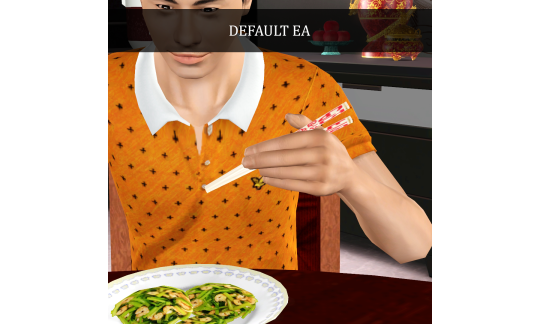
The modded textures:
福 ( Fú ) means happiness, luck, blessing, good fortune.
龙 ( Lóng ) Chinese Dragon symbolizes gods who control rain, weather, and seasons; kind, benevolent, powerful, who bring luck and prosperity.
Peacock symbolizes "grow old together" and will bring harmony to the couple and a long-lasting marriage.
FuZi_Mu ---> Hanzi writing "Fú" with wooden texture.
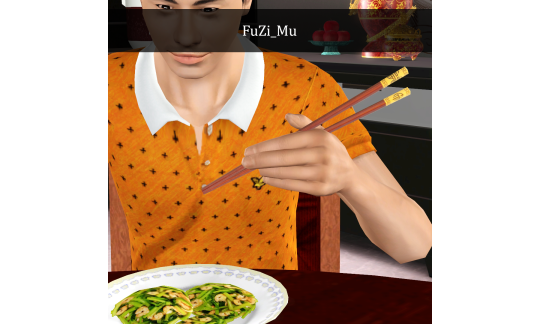
2. BaiNianHaoHe ---> Peacocks with Hanzi writing "BaiNianHaoHe" / 【百年好合】 means "To bless this unison with harmony that would last over hundred years".
In short, wishing the couple everlasting eternal love.
Recommended for your couple Sims and especially have just married.
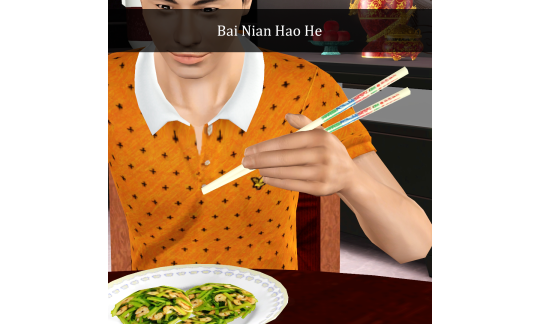
3. Long_HuangSe ---> Yellow colour and has Chinese dragon image with Hanzi writing "Lóng".
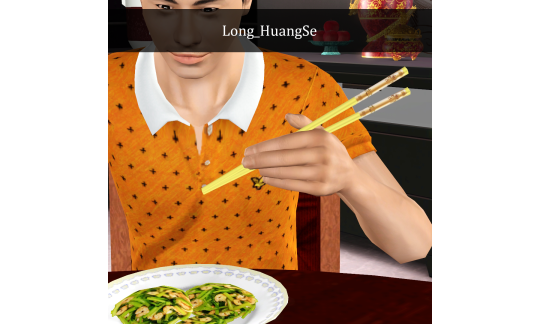
4. FuZi_HeiSe ---> Hanzi writing "Fú" with black colour.
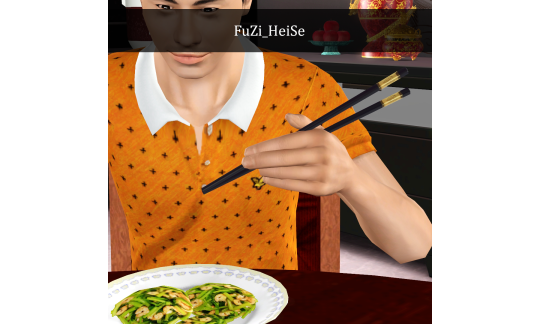
5. FuZi_HongSe ---> Hanzi writing "Fú" with red colour.
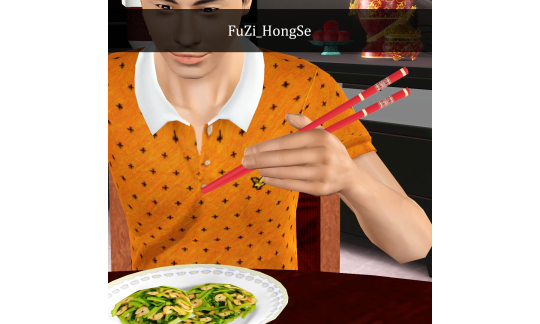
This is custom 3D mesh I created by myself. The bottom end of chopsticks has round shape and upper end has rectangle shape.


I increased the size of texture to 1024 pixels. You can see the details on the chopsticks clearly.
⚠️ Disclaimer: The mod doesn't alter the animation in-game. If you see the chopsticks going through Sim's hand, you should ask that to EA employees why they made the default chopsticks position and animation like that. Default EA The Sims 3 chopsticks are already going through the Sim's hand in the game.
Requirement: World Adventures Expansion Pack
Sim must have Asian trait to have chopsticks while eating.
Tips to unlock Asian trait: NRaas > Master Controller > (Sim) > Advanced > Traits > Change (Master Controller Cheats add-on module required)

⚠️ This package will be replacing the default EA, so you have to choose one. Installing more than one default replacement will cause conflict. ⚠️
As usual, install one of these packages on Package folder. You can safely delete the package if you no longer want to use the default replacement.
【 Download FuZi_Mu】
【 Download BaiNianHaoHe 】
【 Download Long_HuangSe 】
【 Download FuZi_HeiSe 】
【 Download FuZi_ HongSe 】
#the sims#ts3#the sims 3#ts3cc#ts3cc default replacement#ts3 default replacement#ts3 world adventures#ts3 chopsticks#ts3 chinese#ts3 asian#ts3 override mod#ts3 dining#筷子#模擬市民3#chinese culture#shang simla
222 notes
·
View notes
Text
Pain, Suffering, and Narratives in Some Asian Dramas/BLs (An Utterly Un-Scholastic, Highly Personal Big Meta)
I’ve been meditating on the topic of pain and suffering in dramas over the last few weeks, as conversations across Tumblr have been taking place regarding the success (or not) of the Our Skyy 2 x Bad Buddy x A Tale of Thousand Stars episodes. I can’t help but connect these thoughts to some of the fabulous older shows I’ve been watching in my Old GMMTV Challenge watchlist project, where I’m catching up on older Thai BLs in order to better understand the fabulous works that we’re seeing airing now. This Big Meta in part comes out of my having just watched He’s Coming To Me and Dark Blue Kiss, but I was also very deeply inspired by a Japanese BL that many of us here have fallen in love with, Our Dining Table, that features a poignant moment recognizing that feeling pain is a necessity in feeling love for another person -- that accepting pain and suffering is a part of the life we decide to live, from an Asian cultural perspective.
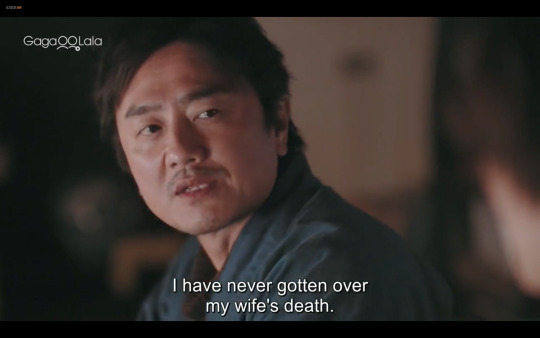

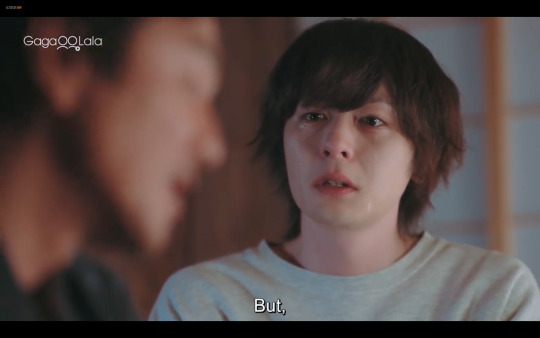
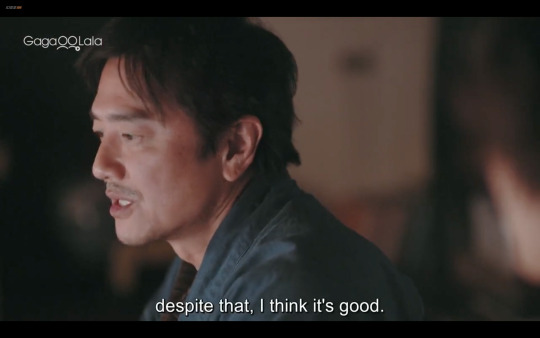



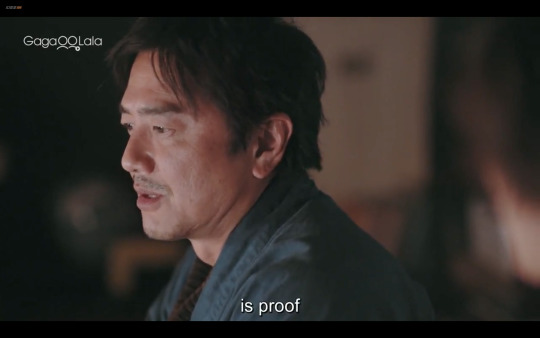

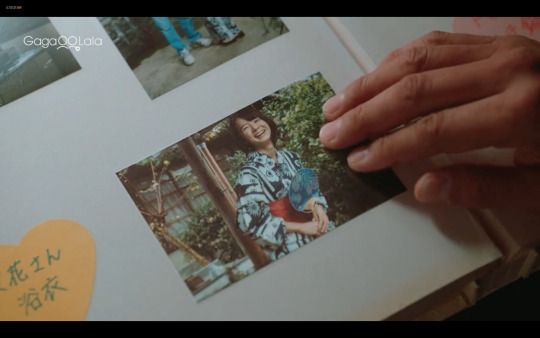
I’m using some big generalities here, so let me explain where I’m coming from. During certain large portions of my life, I’ve explored either becoming a Buddhist, or at least practiced Buddhism, particularly Zen Buddhism. While the world of Western capitalism has unfortunately taken up the majority of my current time/life, I do still have a desire to learn more about the history of Buddhism and try to incorporate some kind of practice in my daily life.
The reason why I offer that caveat is that a core of teaching in at least the spaces of Buddhism that I’ve been privy to, is the recognition of pain and suffering in one’s life. Suffering is a core tenet of Buddhism, one of the Four Noble Truths, and one that a human being does good deeds or makes merit in light of (as we see quite often in our beloved BLs) in order to receive “good” karma for a happy existence in this life or the next. (Again, mad generalizations here, but you get the point.)
I’ve been thinking about this because I often wonder if us Western viewers (I count myself as one, as an Asian-American) are too demanding for linear, clean, direct, and/or happy communication, narratives, and endings, particularly in the realm of Asian BLs, in regards to either romantic love and/or love from one’s nuclear parents/family. I think about this very much in the context of the Asian BL genre, where queerness -- as accepted, OR NOT, in Asian societies, friend groups, and families -- may indicate an existence that is not necessarily a happy one.
There are other issues by way of demands from fans that often determine the outcome of a BL script, such as shipper demands for overtly sexual content. What I’m proposing here is that, in my opinion, some of the best dramas/BLs from Asia are rooted in a reflection and acceptance of the tenets of suffering as a natural part of Asian life and, subsequently, Asian art. I further propose that because of that acceptance of suffering, that we — Western viewers — are often left potentially feeling unsatisfied or unfulfilled by a particular ending of a drama. I posit that the linear/binary/clear outcomes that Western audiences so often demand are limiting in comparison to the non-binary, non-linear journeys and conclusions of art that Asian filmmakers can reach in their work, vis à vis à general cultural understanding that pain and suffering are a part of daily life.
Before I give a drama example, let me use one from real life, that is so very often reflected in art: filial piety. I wrote about filial piety quite a bit in my reviews of Double Savage, a non-BL from Thailand that focused on the plight of a discarded son who was judged by his father as a jinx.
When I try to explain to Western friends that Asian parental love is very often conditional (I myself have experienced it, and my experiences mirror those of my friends), I experience a lot of denial.
“There is NO WAY your parents don’t love you.”
“There is NO WAY your parents will ever give up on you. Even if they treat you badly, they love you.”
“In the West, we ALWAYS end up loving our children. That’s what society demands of PARENTS. We’re CONDITIONED to be like that.”
A major cultural competency issue that Western therapists face with Asian clients is when Western therapists say to Asian clients who are having family issues, “why don’t you just talk to your parents about what you’re feeling?” Talking to Asian parents about a child’s feelings, in MANY instances, is not realistic. The language of that kind of emotion may not even exist. AND, there are unspoken social boundaries AGAINST children having those conversations with their parents in the first place. To have those conversations would very well ROCK the foundation on which Asian families are structured.
My parents may love me — the dad in Double Savage mayyyy have loved his son? — but an Asian parent like that, so rooted in their JUDGEMENT AGAINST an offspring, will often not budge. Time and time again, my Asian friends and family will talk about how they felt unloved as a child -- especially if their skin was darker, if their siblings were more successful in school, if they were a middle child, etc. VERY often, our Asian parents don’t know what us children do by way of work -- my parents don’t know anything about my work, for instance.
The Western perspective and social demands for a STYLE of loving one’s children in a very particular, involved, and empathic way -- those cultural expectations don’t necessarily exist in Asia. So we see parents like, say, Non’s father in Dark Blue Kiss; or Korn’s father in Double Savage; or ESPECIALLY Uea’s mom in Bed Friend, a fantastic example of an Asian parent who takes PERSONALLY every aspect of her son’s social and sexual “differences,” blames him for those differences, and accuses him of ruining HER life vis à vis how he was born to be the way that he is.
And yet, at least for Korn and Uea -- we see those children, for the majority of their dramas, continuing to devote themselves to their parents. Because filial piety -- the Asian cultural and social demand for RESPECTING one’s parents above all else -- is existent and EXPECTED of almost EVERY living Asian, no matter where you live on the continent or your various diasporas.
The equation is: even if you suffer at the hands of your parents, even if you don’t receive unconditional love and empathy from your parents, you must sacrifice in order to respect and serve your parents. You can imagine how much therapy even one individual would need to process that -- if that individual even ALLOWED themselves to think about what was happening, which oftentimes doesn’t even happen.
I’m not saying that filial piety EQUALS suffering. What I’m saying is that the practice of filial piety will almost always ASSUME a level of suffering that one must undertake to participate in the practice of honoring one’s parents.
Where I felt this *assumption* most strongly and recently was in my viewings of three Aof Noppharnach shows: He’s Coming To Me, Dark Blue Kiss, and Our Skyy 2 x Bad Buddy x A Tale of Thousand Stars, but I think Double Savage and Bed Friend also fall into this category as well. Very quickly:
1) HCTM was rooted in storytelling around the practice of Thai-Chinese Buddhism. Thun’s suffering was apparent: he was fatherless, he was gay, and could see ghosts. AS WELL, Med’s suffering was that he didn’t know how he had died, and why he was being held in purgatory before moving on to his next life.
2) Dark Blue Kiss was rooted in internalized homophobia. My big review of DBK is coming next week, but quickly, between the two main couples (PeteKao and SunMork), you had internalized homophobia playing various roles of emotional INTERPLAY, that AFFECTED the external emotional demonstrations of the character -- particularly in Pete, who was viscerally working on becoming a calmer person, but was triggered by Kao’s internalized homophobia to not be open about their relationship, and Pete’s jealousy subsumed him. DBK is the only show I’m mentioning here that has a clean happy ending for all couples involved, but more on that in a second.
3) OS2 x BBS x ATOTS, on the Pat and Pran side, was rooted in a clear but indirect conflict between Pat and Pran about openness and independence. If Pat and Pran had been open about their relationship (à la Pete and Kao) -- would Pat have needed to sound tough to his engineering friends that Pran *depended* on Pat to close loops? And on the Tian and Phupha side -- there is plenty we don’t know about Phupha’s past to make judgements, but I think it’s safe to say that he grew up in such a rural environment in Thailand as to make him assume that coming out and meeting his partner’s parents was an non-reality for the majority of their relationship, until the end of the OS2 series. The journey to get to the point of the ring was a tough one, particularly for Tian, who wanted more openness.
4) Both Double Savage and Bed Friend seem to end happily, especially for Uea and King in Bed Friend. But: Uea loses his parent. Yes -- he NEEDED to lose his mom, because of how toxic she was. But from an Asian family structure perspective -- he only has his sister by the end of that traumatic journey, which is not necessarily an IDEAL or complete ending. The bonds among Korn, Win, and Rung are permanently affected by the behavior of Korn and Win’s dad in Double Savage. The ending is a copacetic one -- they have survived, and will learn to survive together, after all the trauma they have lived through. But it’s not necessarily a HAPPY one. Both of these endings do not necessarily reflect the holistic ideal of the Asian family structure.
I emphasize all of this because, as I said earlier: I think a Western demand to CLOSE LOOPS in Asian dramas is unrealistic.
In Asian life (big generalization, but let me roll with it): you are angry at your parents, and you process it internally, very often without any help, and after a couple days, things go back to the way they were. The children do not demand change from their parents.
In OS2 x BBS, what I DIDN’T SEE -- and, from this framework, what I argue that I DIDN’T *NEED* TO SEE -- were any clarifying conversations between Pat and Pran about how either of them would CHANGE for their relationship. The biggest confession we got was Pat telling Pran, “without you, there is no me,” and Pran quietly agreeing (thank you to @lurkingteapot and @dimplesandfierceeyes for the incredible post on the improved translation of “I can’t live without you”).
But throughout the episodes, we saw their existence together, and arguably, their conditions -- how each of them has organized himself to comport to the other’s immediate needs. How Pran’s larger burden of keeping in the closet to keep his nuclear family structure stable kept them from being totally out, and how Pran designed fibs to be able to have at least one public demonstration of love between him and Pat on stage. They know they cannot solve intergenerational trauma in the span of a series. They’re still closeted two years later. And throughout all of this: how Pat digests Pran’s needs, and keeps his (Pat’s) own needs for openness at bay. We know he feels pain, too, when he makes his confession to Pran in Pha Pun Dao. We know he’s watching Pran as Pran hesitates to put on the bruise cream.
I feel that Pat’s acceptance of this existence is both heart-rending and utterly beautiful from the perspective of seeing Aof’s work as *Asian* art. I feel like, as an Asian, that I KNOW, that PAT KNOWS, what Pran has to lose. Pran has A LOT to lose. And so, Pat -- instead of demanding for outing and openness -- will hold what Pran needs him to hold. He knows when Pran is grumpy, and needs to be grumpy. And Pran’s got a lot to deal with. He’s got so much that he’ll need to go to Singapore, likely to get separation from his mother -- and that will result in him and Pat being separated (and I’m intentionally not analyzing Pran’s need for space from Pat here, but I think we can safely argue that, too, as Pat’s helpful attitude may smother Pran at times) (and there’s also the issue of the nuclear pain that Pat himself may feel at losing trust in his father for his father’s past foibles).
After the OS2 episodes, I didn’t need to know THE REASONS, the stark REASONING for why Pran needed to go to Singapore -- because, indirectly, it was already very clear to me that these young men were already holding tremendous burdens. Singapore, for Pran AND for Pat, could have ultimately been a motivator for growth. But I don’t need to know this. All I know is that they continue to have various levels of pain that they will be dealing with in their nascent adult lives.
While Dark Blue Kiss ULTIMATELY had happy endings -- how it got there was PAINFUL. Kao was ROOTED in fear that he would upend his family’s stability, while being the breadwinner. He was held back by extremely traditional role expectations of an older son. And he had no communication with his mother about straying from those roles. Pete’s dad served as the first -- and, I’d argue, maybe BL’s first -- paradigm-breaker as a parent, being SO open about his son’s queerness as to encourage healthy sex practices. But what I argue in this thesis is that up until the very last, bitter end, Kao was relegated to ASSUME that he would live in pain. His expectation was that Pete would ride with him. Pete couldn’t take it anymore and bubbled over. And Kao was forced to make a decision, for Pete’s sake, literally, to BE open, and to save the relationship. That shit ain’t easy.
Lots of folks who have read my posts on this site know that I appreciate a good Asian drama rooted in family and/or community trauma, like 10 Years Ticket. It’s the way in which Asian filmmakers depict this trauma that speaks very much to my life, my culture, and my viewpoint on what’s realistic in this world, and how that reality can be depicted in art. What I’ve found in watching Asian dramas is... I don’t always want clean endings. I don’t always want loops closed.
Sometimes, Asian kids can’t talk to their parents (Pran, Kao). If you grow up like that, you don’t immediately learn the language of intimacy for your family members, your friends, your lovers (Pran’s struggles after BBS/ep5, Thun’s coming out and not knowing the words for it). It might be EASY, or culturally UNQUESTIONABLE, to not argue with your parents about the ways in which they engage with their children (Korn, Win, Pran). Sometimes, to make a break in order to survive, you need to leave a toxic family member behind, which is NOT an ideal scenario (Uea).
Sometimes, you lose the love of your life (Ueda-san in Our Dining Table). Sometimes, you fall in love with someone — and you find that you can’t *exist* without them (Pat to Pran). And you have to live with the pain. I might even posit that the risk of that pain makes the love you have, either for the person living or the person passed, that much more meaningful to you.
I watch Asian dramas because I don’t feel like Asian filmmakers are subject to the Western demand to clean up all emotionally questionable loose ends. This is not When Harry Met Sally. Harry and Sally should have only remained friends, and not gotten married -- even Nora Ephron and Rob Reiner knew that -- but they also realized that Western audiences would not accept such an ending.
“The script initially ended with Harry and Sally remaining friends and not pursuing a romantic relationship because she felt that was "the true ending", as did Reiner. Eventually, Ephron and Reiner realized that it would be a more appropriate ending for them to marry, though they admit that this was generally not a realistic outcome.”
If I don’t get clean clarity in Asian dramas, I’m okay with it. My mind switches to the pain POV, that relativity mindset. Everyday life in Asian cultures can handle the weight of the painful and sufferable unknown. And that’s why I love these shows.
And, OF COURSE, not ALL Asian dramas are like this! Cherry Magic ended wonderfully. Old Fashion Cupcake ended beautifully. KinnPorsche ended sexily, if not a little confusedly (are they related? kinda? or not? whatever?). Minato’s Laundromat ended happily -- although we’ll see their relationship pain points in the upcoming second season. And we see relationship pain points in the ongoing drama of Shiro and Kenji’s relationship in What Did You Eat Yesterday -- all while they share their happy nightly meals together at their kitchen table.
Life is complicated. I posit that Asian dramas, for my taste, satisfaction, and cultural relativity, do a much better job at depicting that complicatedness than the West can ever do, and that’s why I stand so often on my soapbox to encourage Western viewers to understand these Asian cultural touchpoints more -- to learn about how we’ve accepted pain and suffering as an automatic given in our Asian lives, from our cultures, our spiritual practices, and from living amongst each other.
#our skyy 2 x bad buddy x a tale of thousand stars#bad buddy#a tale of thousand stars#our skyy 2 x bbs x atots#he's coming to me#dark blue kiss#bed friend#double savage#pat x pran#pran x pat#patpran#pranpat#pete x kao#kao x pete#petekao#our dining table#minoru x yutaka#yutaka x minoru#pain and suffering in asian culture#suffering in buddhism#the four noble truths#pain and suffering in asian dramas#pain and suffering in asian BLs
187 notes
·
View notes
Text
okay not to whine after going to a vegan food festival but. why are restaurants increasingly becoming meat-oriented again.
#did you guys know one of my siblings—who was previously pescatarian—reverted back to being an omnivore because she wanted more options when#she dined? which surprised me#and then I went to visit her and we went out to eat#and it was indeed weirdly hard to find restaurants with decent vegetarian options. or like. more than one option.#anyways the hottest new pittsburgh restaurant doesn't have a single thing I can eat on its menu aside from their focaccia lol#:(((((#I feel like seafood and meat are Back In#and I wonder if it's a renewed interest in luxury (after the raw wood and steel chair hipster millennial restaurant days)#or if it's part of the conservative culture redux that we're all going through in the states#(see the use of camo in more clothing across political spectrums and even in queer communities... the rise of country music... etc)
19 notes
·
View notes
Text

#myart#chenoa#native culture#native american#navajo#dine#diné#dance#native american dance#digital art#my art
77 notes
·
View notes
Photo
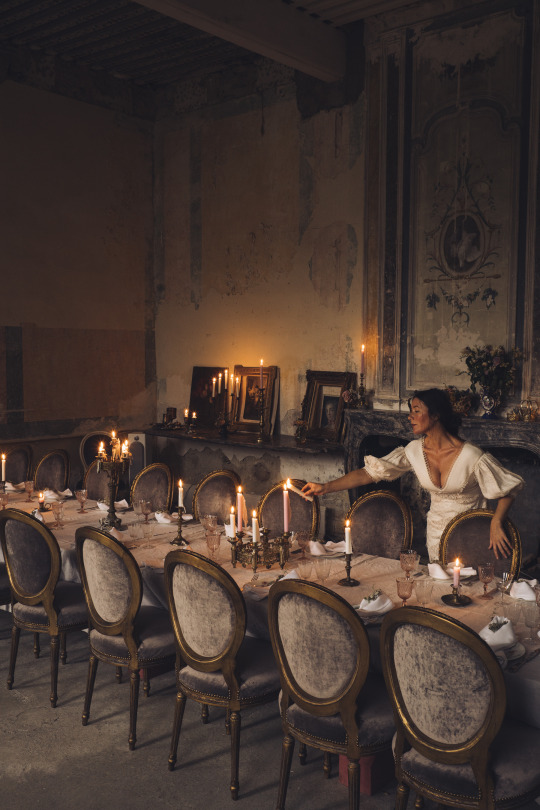
However grand our sacramental downsittings and updressings may be, they remain only and precisely sacraments: real presences, under particular signs, of the happier order that faith can discover under any and all signs. They're a bit like the church. As long as we see them as an earnest of the kingdom, they're all right; when we put on airs and act as if they were the kingdom itself, they look just silly.
- Robert Farrar Capon
So I get asked about how to do a more formal dinner party by my followers. I don’t know what impression I’ve given to make people think that I am an expert but I shall endeavour to present some thoughts around my own beliefs and experiences. I’m sure there are some things I have left out or have temporarily escaped my mind, so do please bear with me.
It is sadly the case that the age of the formal dinner might be over for some but for others they bravely soldier on flying the flag for civilised discourse over dinner.
Yet the reality remains that for many, eating at home with friends or family, or even a volatile mix of the two, is still hugely popular and important. Even if one is throwing a casual dinner party with a laidback “I’m just doing a bit of food” nonchalance, it still needs to be navigated with careful sensitivity.
My rough guide to a good dinner party:
Don’t become a victim of vaunting ambition. Assess your culinary skills and budget before tailoring your social dinner occasion to fit your capabilities. Under no circumstances attempt a maiden voyage. It might seem like a good idea to try a new recipe for your guests, but there are few things sadder than realising that the pork was supposed to have been butterflied by a butcher or rest for four hours...45 minutes before guests arrive.
Send invitations if you can. The more formal the dinner the better you should send an invitation. Make clear (on the invitation preferably) on the time of arrival so that guests are punctual. Except if you’re hosting a dinner party in France then expect French guests to arrive 15 minutes late. While in many countries this may be considered rude, in France this is a golden rule. It’s an unspoken agreement between the host and the guest because the host might be a little late preparing everything and the guest won’t want to embarrass the host by arriving early. Strangely this rule only applies to dinner parties and not for dinners at restaurants. Hmmm.
Make the nature of the dinner event absolutely clear to your guests. They will feel understandably annoyed if they turn up to a formal dinner in jeans and sneakers.
Make sure your drinks cabinet is well stocked. Don’t ever rely on your guests to bring anything. Make sure you choose a different wine to go with each course you are serving. But don’t get too hung up on the food and wine pairing - one can always ask the wine merchant who is both helpful and is dying to show off his knowledge.
Work out your timings. Don’t let drinks go on too long and ensure that food is ready when you call everyone to the table.
Always have a seating plan. Even if it’s an informal one in your head, explain to your guests where you would like them to sit. Chemistry between guests is everything. Choose wisely.
Don’t apologise for the food being served. You made it. You own it.
Remember that your primary role is to be the host/hostess. Attend to your guests at all times and don’t allow yourself to be drawn into an intimate tête à tête with someone. It’s rude to give one guest all the attention at the expense of others feeling a little adrift in their seat.
Play the diplomat at dinner. Lively conversation will no doubt wander to the realm of politics, and whether it’s divisive or just plain dull, a good hostess can re-route a boring or inelegant conversation deftly and effortlessly. The best way to steer the conversation if it strays too deeply into politics, religion, or someone’s burgeoning sex life is to politely interject and offer, “Sorry to interrupt, but I was wondering if I could get everyone’s opinion on X,” and people will be happy to oblige. You invite people into a topic that’s about you and it’s a clear note to the offenders to change course. Important to note also it is perhaps the only time you ever make yourself the subject of the conversation. The role of the hostess is to move the conversation along effortlessly without becoming the centre of attention.
Deploy subtle hints by asking if anyone would like: cups of coffee, offers of taxi service or spare beds, if the evening is going on too long.
Don’t let the guests do dishes - unless they're related to you or they're psychotically compulsive. If they are neither, you might be calling their bluff on an empty offer, and then you've made your guest use your ratty sponge, which is not a very gracious experience.
Most of all, breathe and relax. It will all go swimmingly. Just enjoy yourself.
Bon appétit!
#dinner party#manners#society#culture#food#friends#family#guests#host#menu#etiquette#social etiquette#dining#capon#quote
265 notes
·
View notes
Text










Grand Dining Room and Associated Room Mosaics, Chedworth Roman Villa, Gloucestershire
#roman#roman mosaic#mosaic#dining room#artwork#ancient living#ancient culture#ancient sites#ancient design#motif#symbols#patterns#roman britain#roman wealth#roman living#roman empire#roman society#roman villa#gloucestershire
94 notes
·
View notes
Text
Can BLs be considered rainbow capitalism? I mean, if you really think about it these shows are creating empathy for queer people. Being queer and showing queer in a conservative country is already activism. Sure they can't say or do many things but it's a step by step process. It's slow. It can take decades. And BL has cut the time down to half. Isn't that enough? Seeing gay people have happy lives on screen is the start to having happy queer irl coz it changes minds. We really shouldn't discount how important media is. It can help you win against a stalker charge and it can change the minds of a whole country and make them accepting of queer marriage.
#thai bl#korean bl#japanese bl#for those who don't know - the stalker charge is a case where a lawyer showed Bollywood movies and got his client off the charge#saying stalking is part of the culture#and the other one is joe biden saying will and grace was the show that contributed the most to changing the minds of the american public#kinnporsche#love in the air#the eclipse#gap the series#big dragon#step by step#house of stars#show me love#our dining table#will and grace
48 notes
·
View notes
Text
MAKE YOUR RESTAURANT POPULAR ACROSS EUROPE
Do you want your restaurant to be popular throughout Europe? Call us now! +32 470 48 20 58.
africadigital.eu
#African cuisine#Ethnic dining#Afro-inspired dishes#Traditional recipes#Authentic flavors#Exotic spices#Cultural dining#Afro-Caribbean food#Continental cuisine#Pan-African dishes#International flavors#Exotic meats#Unique dining experience#Fusion cuisine#African-inspired menu#Global cuisine#Traditional cooking#Gourmet African dishes#Savory delicacies#Specialty restaurant#food
0 notes
Text

Sicily
#Sicilian#sicily italy#sicily#historic#balcony#city view#city#city life#cityscape#city vibes#views#view#vibes#visuals#good vibes#dining and entertaining#summer#july#vacation#vacayvibes#toya's tales#toyastales#toyas tales#photograph#photo#photography#culture
180 notes
·
View notes
Text
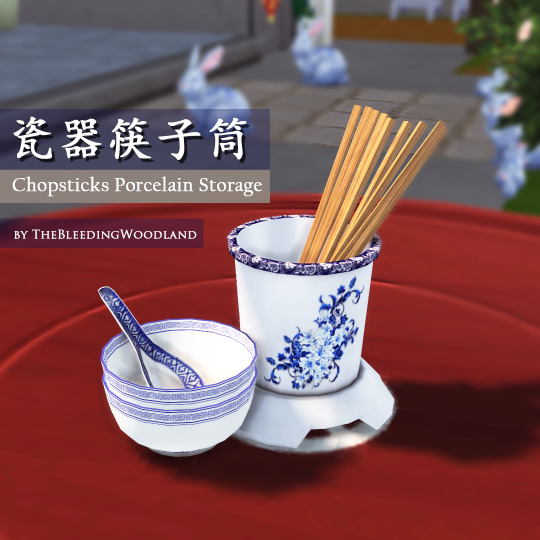
TS4 - 瓷器筷子筒 (Chopsticks Porcelain Storage)
這份禮物為即將舉辦的2024春節。
Gift for upcoming Chinese New Year 2024.
Converted from TS3 version. 4 swatches.
-----------------------------------------------
筒為中國傳統白色和藍色的瓷器做的。 中國筷子很長。中國筷子比日本和韓國筷子很長。其他顏色都是我隨機選的顏色。
The holder is porcelain with classic white and blue traditional Chinese colour. Chinese chopsticks are long. Longer than Japanese and Korean. The rest of colours are random colours by me.
設計靈感來自於淘寶網站上銷售的瓷器筷子筒。
Design inspired from chopsticks porcelain storage product sold on Taobao Marketplace site.
-----------------------------------------------
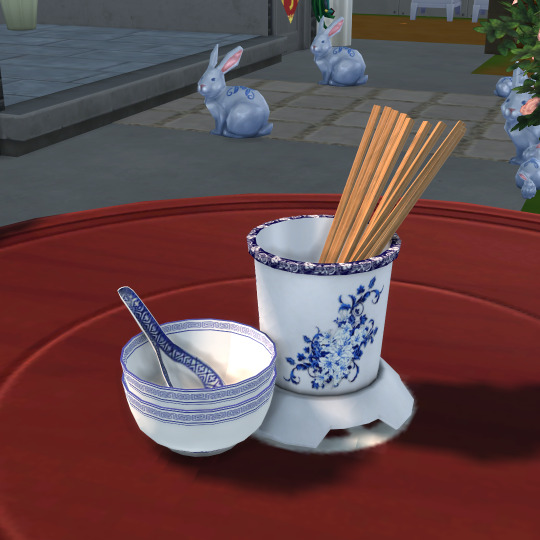
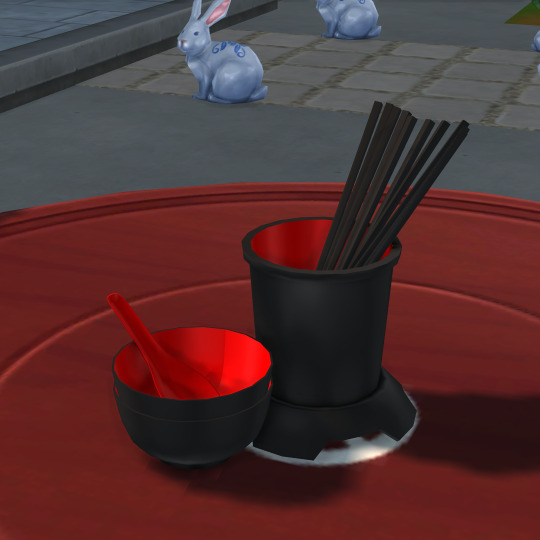
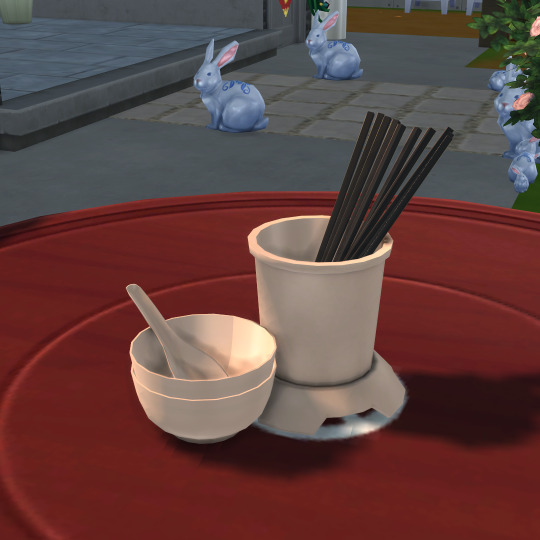
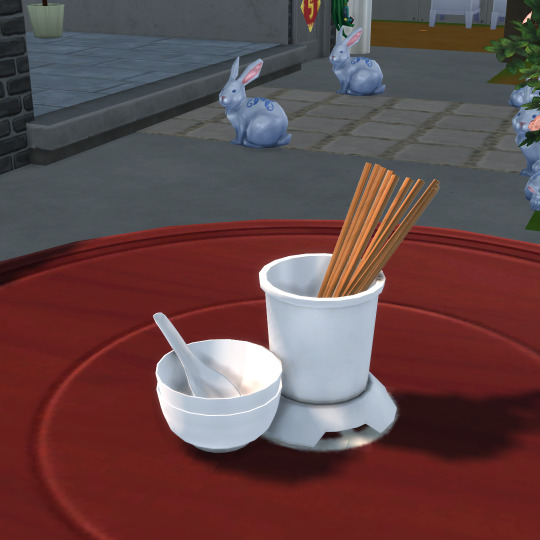
價格:§88
Price: §88
在類別 "裝飾 》雜亂" 上可以找到。
Can be found on Decor>Clutter
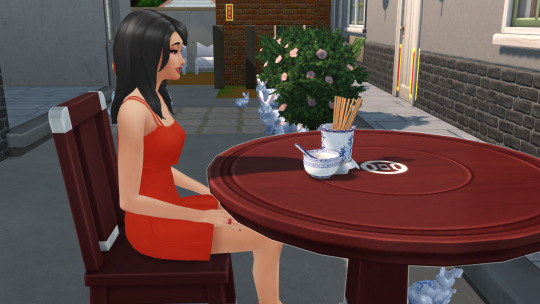

[ Download ]
#the sims 4#ts4#ts4cc#ts4cc clutter#ts4cc buy mode#ts4cc dining#ts4cc chinese#ts4 chinese#chopsticks#porcelain#ts4 asian#chinese culture#ceramic#瓷器筷子筒#模擬市民4#筷子
96 notes
·
View notes
Text
$3 Udon Restaurant in Osaka | Low Budget Travel Japan | Japanese Noodlesoup
Welcome back to Osaka! In this video, we're exploring an authentic Udon restaurant located in Fukushima ward – Udon Sanku, where you can enjoy a delicious meal on a budget while experiencing the true flavors of Japan.
youtube
Full Blog here with all details!
As you step into the restaurant, you'll notice a vending machine to purchase your meal tickets. Don't worry if it's all in Japanese; I'll provide a description of the vending machine in the comments below to help you navigate through the ordering process.
Once you have your tickets, head to the kitchen area, present them, and choose a seat to relax. Like in most Japanese restaurants, you'll find free water available for guests.
Next, listen closely as your order is called, and then head to the counter to pick up your bowl of Udon. Customize your dish with toppings like tempura flakes or chili powder (7 spices) according to your taste.
I opted for the basic version, topped with a raw egg and green onions, which cost only around $2-3. The noodles are delightfully thick and mouthwateringly delicious, complemented by a flavorful broth that perfectly matches the Udon.
Udon has a rich history, dating back over 1000 years, and it's interesting to note that Udon is more popular in western Japan, while Soba takes the lead in eastern Japan. Surprisingly, Udon and Somen share the same noodles, with the primary difference being their thickness – Somen being very thin and Udon, as we know it, being thick and hearty.
Once you finish your delightful meal, remember to return your plate to the kitchen and dispose of the one-time-use items yourself.
It's important to mention that the exit is separate from the entrance in this restaurant, so make sure to head in the right direction when you leave.
Thank you for joining me on this Udon adventure in Osaka! If you enjoyed this video, please give it a thumbs up and consider subscribing for more exciting food tours and travel experiences.
youtube
#Japan#Osaka#Osaka food#food#foodie#Japanese food tour#Udon restaurant#low budget travel Japan#Fukushima ward#Japanese noodlesoup#authentic Japanese cuisine#Japan travel#Osaka food scene#Udon Sanku#vending machine ordering#Japanese dining experience#Japanese culture#food exploration#food vlog#food adventure#Udon vs. Soba#budget-friendly meals#delicious Japanese noodles#Youtube
15 notes
·
View notes
Text
"FEMEN*ZIS ARE TAKING AWAY SEXINESS IN MY VIDEO GAMES!!1!!"
Dude, it's conservatives and fascists are planning to censor/ban sexiness in video games because of "degeneracy" and "protecting children"; not folks like Sarkeesian and such who are... just talking about video games.
#like there's a lot of problems with her critiques (namely citing Gail Dines whom has worked with conservative groups#but i'd be far more concerned with far-right attempts of censorship than a Canadian culture critic talking about games tbh#video games#feminism#antifascist
2 notes
·
View notes
Photo

Why do some restaurants play music more suitable for the young people who work there than for the middle-aged people who eat there?
- Thomas Sowell
47 notes
·
View notes